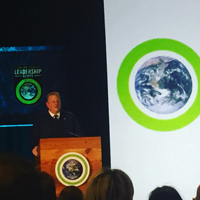
On June 9, 2015, the California Center for Public Health Advocacy was able to push through in San Francisco the nation’s first Soda Warning Label and advertising moratorium on surgary soft drinks.
“By requiring a health warning on all sugary drink advertising and restricting marketing of the same on public property, San Francisco has become the nation’s first city to ensure its citizens are fully informed about the damaging impact these beverages have on the public’s health.
“The new warning label requirement on sugary drink ads does exactly what the beverage industry has long called for: provides consumers with education. Now, for every advertising message saying ‘live for now’ or ‘open happiness,’ consumers will also receive a science-based reminder that these products contribute to diabetes, obesity and tooth decay.”
Ironically for a brand like Coca-Cola, this is huge blow. Even though they just announced at Sustainable Brands conference in San Diego last week about their recycled bottles plan, and their efforts for water conservation in various areas where Coke is sold in developing countries, it can’t replace the fact that they are selling an unhealthy product primarily targeting young adults.
In addition, their sponsorship of various programs, including the Olympics, may now come under greater scrutiny.
As we have seen in our 15th Annual Spring Youth Culture Study 2015 and Sustainability and the State of Youth Culture Studies, young people especially teens are far more concerned about the environment and health than ever before. In many cases, they say they are the ones that have taught their parents to read labels on food and beverage products.
Sugary drinks are the single largest source of excess calories in our diets, and countless studies have shown that having just one sugary drink a day increases a child’s risk of becoming overweight by nearly 60 percent, while also increasing an adult’s risk of diabetes by 26 percent.
“I’m thrilled that San Francisco has taken the model introduced by State Senator Bill Monning and put it into action on the local level. Hopefully, other elected leaders at the city and state level will follow suit and put the welfare of their residents before the desire of the beverage industry,” said Dr. Harold Goldstein, Executive Director, California Center for Public Health Advocacy.


